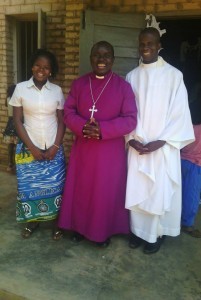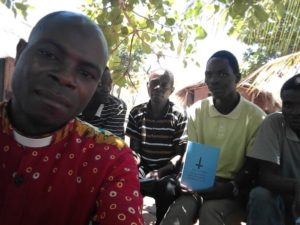Below is a recent letter from the new Bishop, Manuel, in Niassa who was consecrated in July this year as suffragan bishop to set up the structures and train leaders of all sorts in the Episcopal Areas of Lurio (Cabo Delgado and Nampula provinces) and Zambezia province. Bishop Manuel has a huge and spread out area of many new Christians, growing urban places as well as deeply rural places. Here, he writes about his impressions and hopes after his first few months, with his emphasis on young people, leadership development and training of trainers, and unity……..
MEMO: Report and Notes on Ongoing Training Work at Lurio and Zambezia 12 December 2014
by Bishop Manuel
 This serves to briefly report on the work of multiplication of the areas of Lurio and Zambezia over the period of four months towards becoming new dioceses. A broader report highlighting the strengths, challenges, opportunities and threats of each parish will be sent out in few weeks time.
This serves to briefly report on the work of multiplication of the areas of Lurio and Zambezia over the period of four months towards becoming new dioceses. A broader report highlighting the strengths, challenges, opportunities and threats of each parish will be sent out in few weeks time.
First of all, I visited most of the communities to know the flock and instil the new vision in them. I agree that the bishop has a unique role to be present as much as possible so that people can identify that, yes, this is a diocese and there is unity here among the priests and with the people. That is what I feel is a very important value to build upon it.
I also wanted to make sure the Christians who are spread across that geographic vastness feel they are part of something greater. I sensed that the greatest needs for Lurio and Zambezia which will demand urgent response include, among others, spiritual and practical Christian leadership; organizational capacity building for parishes; sustainability; and liturgy and literature in local languages to stimulate corporate worship and sense of Anglican identity .
Along with routine roles of leading Eucharist celebration and confirmation of new congregants, I extend pastoral visits to train trainers and facilitators on basics of faith and diocesan vision and programmes on discipleship, stewardship, ministry, mission and community involvement with emphasis on the local context of each congregation. I gratefully saw enthusiasm among members of existing groups of Mothers Union, Men Ministry ( St Bernard Mizeki Guild), St Agnes and Youth.
I also found useful setting a Sunday school session of 30 minutes before the Eucharist where each group member can share news, get to know others by name and reflect on the theme of the day. One woman in Napipine asked me ’Baba, Sunday school is not meant only for our children?’ Of course she epitomizes what we used to think about learning in the church and in the country, that it is only for the beginners. But if one goes back to the early church, we see that learning was in the center of the community and was intended for all people in every age and walk of life.
My greatest hope in 2015 is to see radical change of paradigm thinking and acting at parish level by convincing church leaders that the life of a diocese is in its congregations and not otherwise. To do so, I propose to our leadership team and congregants five objectives towards multiplication, namely:
1) finish the bishop’s house in Lurio and put in place administration and business support team to assist on the growing office work;
2) reverse the parish contribution deficit from 30% to 70%;
3) re-structure and supervise parish governance and administration;
4) hold a clergy school and retreat and train and license 40 church wardens and 50 laity and catechists to be regional trainers and focal points in remote areas. I strongly believe that catechists, men and women, are memories of the church. Priests come to the parish and go to another but these committed flocks remain, so I want to give them attention;
5) Moreover, in 2015 we will focus on the congregational transformation through discernment of the gifts of the Spirit in our people .We intend to replicating the local version of the diocesan and the provincial programs on evangelism with youth in the focus.
To lead a growing church we are challenged to grow as well. So I have committed myself to personal growth and, with ALMA funding, enrolled in a two year MTh of Integrated Theology. The first year went well. I encourage the clergy whenever we meet to take over the responsibility for their own spiritual and intellectual personal growth.
Our family has now grown to five members. My wife Laura is teaching Moral and Ethics; our firstborn daughter Osvalda turned recently 22 and her RH management studies are going well though faculty fees strain our already stained budget. The generous assistance from the diocese and ACSA is helpful. Miriam, 7 years old, passed to grade 3 and Fabio, just 2, is under the care of the nearby church pre-school. Laura, with a Diploma in theology, and Adelia, Archdeacon Daniel’s wife, recently graduated in nursing, are planning with us a response to growing needs on redemptive gender issues particularly the initiation of girls and boys and how to do it safely in churches as our local culture in this matter allegedly encourages ungodly masculine superiority and women submission with huge negative impact on education , health and reproductive rights. Venerable Daniel himself is very enthusiastic and, as Area ministry department coordinator, will be spearheading the initiative along with the Mothers Union, St Bernard Mizeki and St Agnes and parent representatives.
Therefore, these four- five months were entirely dedicated to getting to know the people we are charged to love and lead, and also to engender hope in the congregations and let them realize that we are one family in northern Mozambique and a communion worldwide.
Advent Hope and Gracious Love,
Manuel




